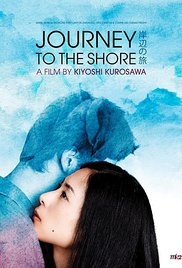Eye For Film >> Movies >> Journey To The Shore (2015) Film Review
Journey To The Shore
Reviewed by: Jennie Kermode

The process of dealing with grief is often described as a journey. Perhaps it's one that Mizuki (Eri Fukatsu) thought she had already completed. In the three years following her husband's disappearance she has reinvented her life, dealt with the practicalities, dealt with the rituals (writing out a prayer for his safety 100 times). It's the sadness that lingers. When he returns, explaining that he died at sea and his body has been eaten by crabs, she tries to take it all in her stride, merely chiding him for not taking off his shoes before entering the house. It is important, in Japan, to avoid bringing dirt into the house that way; for the same sort of reason, people usually take off their shoes before taking their own lives. Perhaps it's because Yosuke (Tadanobu Asano) still has his shoes on that he hasn't yet entered the afterlife.
He has travelled, he tells her, making an arduous journey on foot from the place where he died in order to be with her again. Now he wants to introduce her to the people he met along the way, some living and some dead. So they set off to retrace his route - using trans and buses this time. Yosuke seems fully able to interact with others; he looks like anyone else. He can't return her physical advances, however. This might be a metaphor for the more general impotence of the dead in a society where their ongoing relevance to the living is generally respected and ritually acknowledged.
There are many places where details of Japanese culture and tradition add richness or even levity to the story, something which will sadly be lost on many Western viewers, but even without that it's a powerful film. Akiko Ashizawa's use of light to conjure up a sense of otherworldliness isn't always subtle but, in combination with Kiyoshi Kurosawa's camerawork, works very effectively. Showa Matsumoto's use of ambient sound elevates he film into something really special. As for the performances, Asano is fittingly blank and distant for much of the running time but there's a wonderful flexibility to Fukatsu's performance as a woman who bears endless slights as she struggles to retain her decorum. There is a painful comedy of manners here, particularly when she confronts another important figure in her husband's life, yet she gradually moves beyond that vulnerable place towards a fuller understand of herself as an individual. As Yosuke considers the different things he could have done with his life, she is considering the things she could do with her future.
There's a shot early on in Journey To The Shore, where Yosuke is framed against a window, that appears to directly reference Truly, Madly, Deeply, yet despite their ostensibly similar plots this film moves in a very different direction. With roots in ancient spirituality and the will to develop a mythology of its own, it's a deeper look at the spiritual reflection and essential introspection that bereavement can provoke. Though slow in places, it's also a starkly beautiful and intriguing piece of cinema.
Reviewed on: 20 May 2016

















